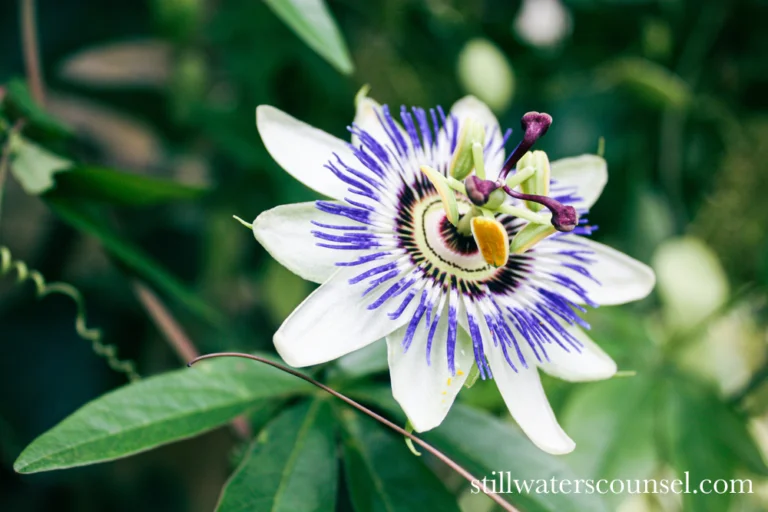Nervine herbs are really any herbs that modulate and support the nervous system. As you might imagine, they are often used for things like: reducing stress, anxiety, and insomnia, improving mood, cognition, and/or supporting focus and attention. In this blog post, we’ll discuss five commonly used (and highly effective) nervine herbs.
1. St John’s Wort (Hypericum perforatum)
St John’s Wort has a stunning bright yellow flower whose leaves are quite literally perforated. Hold one up to the sun and the light will shine right through. And this is just how St John’s Wort works, by helping someone experiencing depression to uncover and re-discover their own inner light. This plant stimulates metabolism in both the nervous system and the liver, which is why it should never be used in combination with other medicines without medical supervision.

The reasons for St John’s Wort effectiveness are many. It inhibits the re-uptake of some neurotransmitters like gamma-aminobutyric acid (GABA), which helps to induce a state of calm. Additionally, it upregulates serotonin receptors in the brain, thereby increasing the effect of whatever serotonin is present. It also inhibits some enzymes that break down neurotransmitters needed in order to sustain positive and even mood, meaning that these chemicals get to stick around in the brain for longer periods of time.
2. Passionflower (Passiflora incarnata)
Passionflower is a calming herb that has been used for centuries to treat anxiety and insomnia. It is thought to work by increasing the levels of gamma-aminobutyric acid (GABA) in the brain, though evidence is mixed, and the mechanism of its effect is unclear (Note: GABA is a neurotransmitter that helps to calm the nervous system).
It is particularly effective for folks who have trouble falling asleep because of circular thinking and ruminations.

3. Valerian (Valeriana officinalis)
Valerian, despite its strong, pungent (some might say awful) smell, is another herb that has been used for centuries to treat anxiety and insomnia. It’s mechanism of action is thought to be threefold: stimulating the release of GABA, inhibiting re-uptake of GABA (i.e. more is around to do its thing), and binding to GABA receptors (makes the nervous system thing there’s GABA where there’s not necessarily any).
Valerian is often used as a sleep aid and has been found to improve sleep quality and reduce symptoms of insomnia. In addition, it is used for fibromyalgia and to offset symptoms of withdrawal from benzodiazepines (of course, only under medical supervision!).
4. Lemon Balm (Melissa officinalis)
Lemon balm is simultaneously calming and uplifting, with historical uses including wound healing and clarifying thought processes. Emotionally, it’s a balancing herb, and is helpful for most any type of nervousness, including ‘nervous exhaustion’ more commonly known as burnout.
It is a safe herb, and to make a tea, simply add 2tsp of dried leaves to 1 c boiling water. Infuse for five minutes, strain, and drink!
Very similar in its effects to chamomile (see below), Lemon Balm is more indicated when the expression of symptoms manifests in a passive way, rather than actively demanding. It works by binding to GABA receptors in the brain and thereby calming excess or chaotic nervous system activity. Lemon balm has also been found to have an anti-depressant effect.
A part of the mint family, Lemon Balm is famously easy to grow, and is a lovely addition to any window box or herb garden. Do be sure to keep it in a pot if you don’t want it to overtake more than its fair share of real estate!
5. Chamomile (Matricaria chamomilla)
Chamomile is a frequently underestimated herb, perhaps because it is so widely available, and its gentle nature. It may be given for fever, indigestion, tension, anxiety, insomnia, and even pain. It is particularly indicated if anxiety or upset has qualities of whining, irritation, and/or wanting to self isolate. Additionally, it is an excellent herb for folks who express their anxiety via the gastrointestinal system, a la irritable bowel syndrome.
Used for centuries to reduce stress and anxiety, chamomile works by potentially binding benzodiazepine receptors, and by increasing the levels of GABA in the brain. Chamomile is often used as a sleep aid and has been found to improve sleep quality.
While many herbs are generally recognized as safe (for example lemon balm and chamomile), others do potentially require supervision, as they can be harmful. Remember: natural is not the same as safe! If you’d like to add herbal medicines into your treatment, set up an appointment with Dr Katherine!
